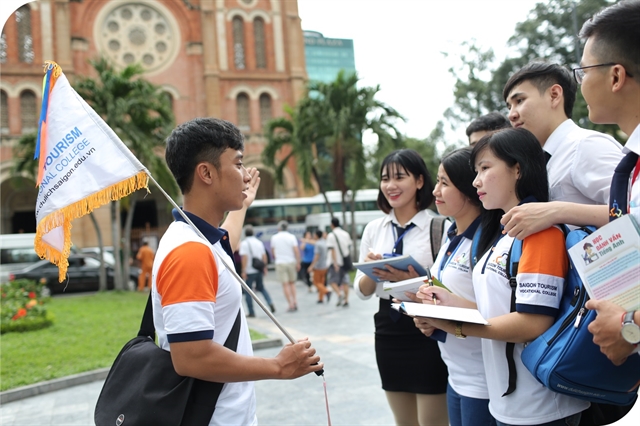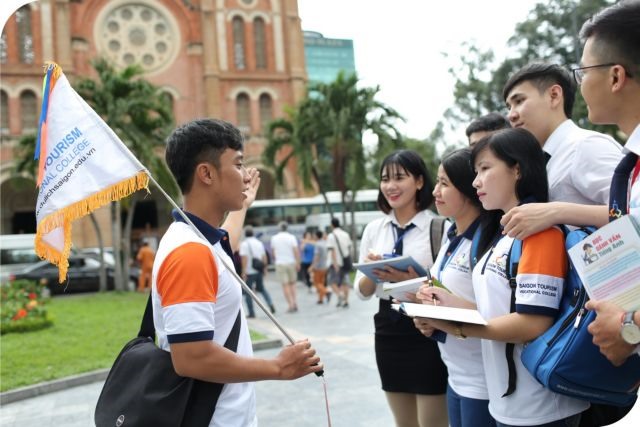[ad_1]
Lê Hương
There’s an emerging consensus among tourism experts across the country that the sector needs to focus on improving its human resources.
Most tourism enterprises ceased operation during the two-year pandemic, and coming back could prove difficult.
Phạm Văn Thủy, Deputy General Director of the Việt Nam National Administration of Tourism (VNAT), said human resources were now the main problem in the industry.
“Most tourism workers are not ready to return to work, while some changed to other jobs and are unwilling to return,” he said.
According to Nguyễn Hồng Hải, General Director of Dân Chủ Trade & Service Company, investor of De L’Opera Hanoi hotel, before the pandemic, the company had 168 staff, but this has now fallen to 103. Most do not work full time as there are only a few guests, and their income has been significantly reduced.
“To keep staff, we have flexible policies like reduced working days and preserving a minimum salary so that the staff do not end their contracts while supporting them to pay social insurance, health insurance and unemployment subsidy,” he said.
Hải said competition in recruitment was increasing not only among tourism enterprises but also in other fields, especially for high-quality staff.
Nguyễn Thanh Thủy, Director of Silk Path Hotel, said holding on to staff and preserving their morale was a key issue.

As a hotel serving quarantined guests, the pandemic required hotel leaders and managers to be more energetic and creative in paying close care to staff and making adjustments in policies and support.
Vũ Thế Bình, Chairman of the Việt Nam Tourism Association, said that human resources were a weak point for Việt Nam’s tourism sector even before the pandemic, especially in 2019.
“After COVD-19, the problems seem to be more serious,” he said. “There’s a serious lack of high-quality staff. Around 70-80 per cent of human resources in the field, including high-ranking officials, have graduate degrees but only 2-3 per cent hold degrees in tourism.”
Solutions
Nguyễn Văn Đính, Chairman of the culture ministry’s Scientific & Training Council, suggested setting up a data system on the human resource of enterprises with updated demands for positions.
“We should like information of enterprises, concerned management agencies, media and social networks so that the workers have enough information,” he said.
The government and enterprises can set up hotlines to support enterprises, which workers can access to find support.
He said enterprises should coordinate with training institutions to recruit long-term or short-term workers for their operations.
“Travel agencies that need foreign-language speaking guides can sign contracts with students from foreign language schools and offer express training for certain tours,” he added.
The sector should focus on training new students and re-training former workers, ensuring living conditions for workers in the new normal situation and promoting digital transformation to save human resources and enhance productivity, he said.
Lê Anh Tuấn, head of the ministry’s training department, said the ministry had just approved a plan to develop tourism human resources to adapt to the pandemic’s consequences for 2021-2030.
He said that the plan aims to develop human resources on a large scale with the proper structure for the sector to become a key economic area.
Nguyễn Thanh Bình, Deputy Head of the Hotel Department of the VNAT, stressed the need to examine human resources to figure out weak points and the lack of skills in each unit.
“We also need to research market demands and forecast the sector’s development to calculate demand for training at institutions, workplaces, and new staff plans,” she said.
Bình also said enterprises should have favourable policies to recruit previous workers.
“Enterprises should have salary policies increasing according to years of working and proficiency to encourage staff to learn and practice for higher quality standards,” she said.
For the longer term, Bình expects better job direction for parents and students before entering school.
“We should enhance the quality of students who graduate from vocational institutions,” she said. “We should be more flexible in policies to permit students to learn higher skills and change to other fields, especially foreign languages.”
Trịnh Cao Khải, Rector of Hà Nội Tourism College, stressed the need for schools to coordinate with enterprises to train students more closely to the needs of enterprises.
He suggested a national and regional tourism skill criteria system and establishing job and sector councils to approve professional skills for workers.
“We should complete a criteria system for professional tourism skills and propose that ASEAN approve our national system,” he said. VNS
[ad_2]
Source link
